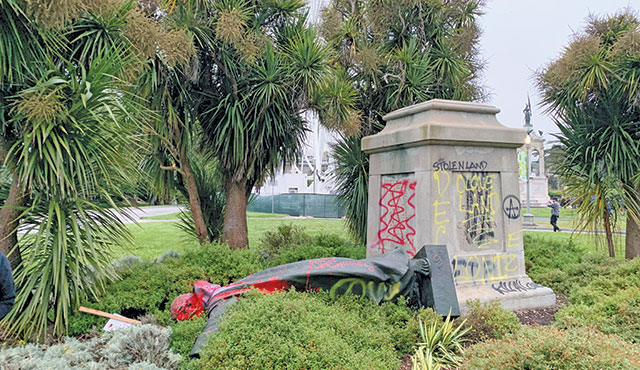Editor’s note: The following are excerpts from Archbishop Gomez’s column which first appeared on AngelusNews.com on June 29. The full column can be found there.
My dear brothers and sisters in Christ,
Recently, statues to the Apostle of California, St. Junípero Serra, were torn down in San Francisco and in the plaza outside our first church, Nuestra Señora Reina de los Ángeles, in downtown Los Angeles. Up and down the state, there is growing debate about removing St. Junípero memorials from public lands. Ventura officials have announced that they will hold a public hearing July 7 to debate whether to take down his statue from in front of Ventura City Hall.
Faced with the possibility of vandalism, we are taking increased security precautions at the historic missions located in the Archdiocese of Los Angeles. Unfortunately, we will probably have to relocate some statues to our beloved saint or risk their desecration.
These developments sadden me. I have been thinking and writing about St. Junípero for many years now.
I understand the deep pain being expressed by some native peoples in California. But I also believe Fray Junípero is a saint for our times, the spiritual founder of Los Angeles, a champion of human rights, and this country’s first Hispanic saint. I was privileged to celebrate his canonization Mass with Pope Francis in 2015. I rely on his intercession in my ministry, and I am inspired by his desire to bring God’s tender mercy to every person.
The exploitation of America’s first peoples, the destruction of their ancient civilizations, is a historic tragedy. Crimes committed against their ancestors continue to shape the lives and futures of native peoples today. Generations have passed and our country still has not done enough to make things right.
Over the years, I have come to understand how the image of Father Serra and the missions evokes painful memories for some people. For that reason, I believe the protests over our history in California, and the broader protests that have started elsewhere in the country over historical monuments, are important.
Our society may reach a consensus not to honor St. Junípero or various other figures from our past. But elected officials cannot abdicate their responsibilities by turning these decisions over to small groups of protesters, allowing them to vandalize public monuments. This is not how a great democracy should function.
In other cases, it is clear that those attacking St. Junípero’s good name and vandalizing his memorials do not know his true character or the actual historical record.
The sad truth is that, beginning decades ago, activists started “revising” history to make St. Junípero the focus of all the abuses committed against California’s indigenous peoples.
But the crimes and abuses that our saint is blamed for — slanders that are spread widely today over the internet and sometimes repeated by public figures — actually happened long after his death.
It was California’s first governor who called for “a war of extermination” against the Indians and called in the U.S. Cavalry to help carry out his genocidal plans. That was in 1851. St. Junípero died in 1784.
The real St. Junípero fought a colonial system where natives were regarded as “barbarians” and “savages,” whose only value was to serve the appetites of the white man. For St. Junípero, this colonial ideology was a blasphemy against the God who has “created (all men and women) and redeemed them with the most precious blood of his Son.”
He lived and worked alongside native peoples and spent his whole career defending their humanity and protesting crimes and indignities committed against them. For St. Junípero, the natives were not just powerless victims of colonial brutality. In his letters, he describes their “gentleness and peaceful dispositions,” he celebrates their creativity and knowledge; he remembers little acts of kindness and generosity, even the sweet sound of their voices as they sang.
St. Junípero also understood that the souls of indigenous Americans had been darkened with bitterness and rage at their historic mistreatment and the atrocities committed against them.
Pope Francis called St. Junípero “one of the founding fathers of the United States.” He recognized that the saint’s witness anticipated the great spirit of human equality and liberty under God that has come to define the American project.
Yet in online petitions today we find St. Junípero compared to Adolf Hitler, his missions compared to concentration camps. No serious historian would accept this, and we should not allow these libels to be made in public arguments about our great saint.
My brothers and sisters, this is the truth about St. Junípero.
Let us ask St. Junípero’s intercession for this nation that he helped to found. Let us pray with him for healing, reconciliation, an increase in empathy and understanding, an end to racial prejudice, and a new awareness of what it means that all men and women are created equal as children of God.

